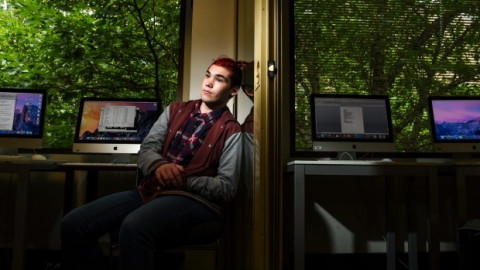
Matthew Wearing had nightmares about going to school.
He remembers being severely bullied, and being dismissed and laughed at, as though he were a "second class student".
Eventually, at 15, he decided that he wouldn't go back.
He missed nearly three months of year nine.
"I did develop a fear," he says. "A fear of not being accepted. I felt it all day and all night."
It is often mistaken for wagging, but "school refusal" is a serious behavioural problem, with international research showing up to 28 per cent of students having refused school at some point.
While not a mental health problem in itself, two thirds of cases involve students who suffer from mental health issues.
For them, the idea of school can elicit a level of fear so intense that for weeks, months, and sometimes years, they cannot bring themselves to go.
Dr Lisa Mckay-Brown, lecturer in learning intervention at Melbourne University's Graduate School of Education says many types of experiences can trigger the refusal.
Kids may have separation anxiety, or develop a fear of moving from primary to secondary school, public speaking, or being bullied.
Many complain of stomachs or headaches in a bid to stay home. Some enter a frenzy, and have panic attacks before school.
"It can get to the point where the young person refuses to get up in the morning," says Dr Mckay-Brown.
"They can't walk out of the house, or get in the car to go to school. They don't want to go because the idea of school is so debilitating for them."
Schools, youth organisations and medical practitioners say school refusal is a growing problem in Victoria.
While Dr Mckay-Brown worked at Travancore School – a mental health-focused special school – refusal referrals jumped from 10 to 30 per cent between 2009 and 2013.
The behaviour can lead to considerable academic and social disadvantage, and a higher risk of dropping out.
Seven school refusers have been selected to partake in a research trial called In2School run by the Graduate School of Education, the Royal Children's Hospital and Travancore School.
The 13 and 14 year-old students have missed between three months to two years of schooling. Most have anxiety disorders and many have difficulty interacting socially.
As part of the trial, two teachers and a social worker teach the kids in a special "transitional" classroom at Travancore School.
They offer what is called "graded exposure" – a slowly, slowly approach to returning to school.
Students start the program merely driving to school in the morning, and then they return home.
This develops into spending just an hour, or two hours at school, before the student eventually stays for the full six-hour day, four days a week.
Two teachers teach the Victorian Curriculum, to catch the students up on their learning, and a social worker offers one-on-one cognitive behavioural therapy (the main treatment for school refusal behaviour).
They also run sessions for parents – some of whom have paid emotional and financial costs as a result of their kids' refusal.
The program has been running for five months, and two of the students will now attend school in 2016.
After missing a term and a half of school, Matthew moved to an alternative school at Melbourne City Mission's Melbourne Academy in 2013.
He says an alternative education setting gave him the freedom to learn about his passions – history and poetry.
He hasn't skipped a day in two years, and has just graduated from year 12.
"I think schools need to support individuals, rather than deliver one curriculum for everyone. They need to be flexible, so the interests of students can be enhanced."
from http://www.theage.com.au/victoria/school-refusal-anxious-kids-miss-months-even-years-of-class-20151210-gll3zb